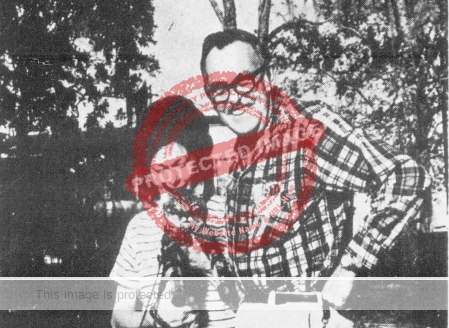Multilingual playwright Samuel McCulloch (1921-1991) and his wife, Jennie, lived in an old adobe house in Ajijic for six years from 1956 to 1962. In a 1958 press interview, McCulloch told a reporter that in Ajijic he was writing plays, working daily from 11 am to 7 pm, with a break for lunch, and that “When we first went there two years ago, we had electricity only at night. Now we’ve got it round the clock, except when the plant is broken down, which is every few days.” McCulloch named the plant operator as “Pancho de la Luz” and added that there were “about 75 Americans in Ajijic, many of them retired business and professional men and their wives.”

Sam and Jennie McCulloch, 1972. Credit: Concordia Sentinel.
Born on 9 February 1921 in Memphis, Tennessee, McCulloch was educated at Central High School, Memphis, and Choate School in Connecticut. (Coincidentally, a former teacher at the Choate School—novelist Christopher Veiel—had lived in Ajijic a few years earlier.) McCulloch then studied at Haverford College in Pennsylvania, before graduating with a degree in English and Greek from Southwestern (now Rhodes College) in his hometown.
During the second world war, McCulloch served with the US Army as an interpreter and interrogator of prisoners of war in Africa, Italy and France, work which improved his command of German, Italian, French and Spanish.
After the war ended, McCulloch took classes at the Sorbonne in Paris and at the University of Perugia, Italy, before completing an MA in drama at Syracuse. In 1947 he registered the copyright of a film script, apparently never published, titled “The Turning Point.”
In 1952 he returned to Memphis and helped found the Arena Theatre in Memphis, Tennessee; McCulloch also operated a summer theater in Myrtle Beach, South Carolina. The Arena lasted only a couple of years, but attracted stars such as John Carradine and Eva Gabor to perform in its plays. The theatre ran into censorship problems in 1953 when McCulloch adapted Erskine Caldwell’s novel Tragic Ground, which features a young man and woman in bed, but clothed. The performances were duly moved to a nightclub in West Memphis.
It was at the Arena that McCuloch met his wife, Jennie Keeter, who had majored in English at Queens College in Charlotte, North Carolina, and took a part-time gig as a volunteer usher. Not long after the Arena folded, the couple couple moved to Ajijic. In his 1958 interview, McCulloch claimed to have been writing most of the time; in a later interview he claimed that in Ajijic the couple “did absolutely nothing for six years.”
What did McCulloch and his wife think of Ajijic. When they returned briefly to Memphis in 1959, Sam told a local newspaper that He had just put a manuscript in the mail, that “Harper’s is bringing out a novel soon by one of our people” and that “The Golden Fleecing,” written by another Ajijican, Lorenzo Semple Jr, had recently received good notices on Broadway. (Note that it is unclear which Harper’s novel was being referred to; Willard Marsh’s Week With No Friday, set in Ajijic, was not released by Harper’s until 1965.)
However, even if McCulloch was optimistic about his writing career, he reported that Ajijic was “now crawling with Americans so Jennie and I are sneaking around at night, putting up “Yankee Go Home” signs.” Goodness only knows what McCulloch might say if he were able to visit Ajijic today!
After their extended vacation in Mexico, McCulloch joined the US Information Service and the couple spent three years in Paraguay, followed by stints in Chile, Guatemala and Washington DC, where McCulloch was cultural coordinator for Latin America.
Sam and Jenny McCulloch retired to Jonesville, Lousiana, in 1972, shortly after buying a home, sight unseen, on Horseshoe Lake. Mementos from their time in Mexico and their travels were proudly displayed in their lakeside home.
McCulloch died in Baton Rouge, Louisiana, on 17 March 1991, shortly after his 70th birthday.
To read more about life in Ajijic in the 1950s, and the many authors who lived there, see the 13 chapters that comprise Part C of Foreign Footprints in Ajijic: Decades of Change in a Mexican Village.
Sources
- The Commercial Appeal (Memphis): 9 Dec 1965, 68; 20 March 1991.
- The Memphis Press-Scimitar: 25 Dec 1958, 16; 30 Dec 1959, 11.
- Bea Nathanson. 1972. “They came on a Visit – and Returned here to live.” The Concordia Sentinel, 15 Nov 1972
Comments, corrections and additional material welcome, whether via comments feature or email.
Tony Burton’s books include “Lake Chapala: A Postcard History” (2022), “Foreign Footprints in Ajijic” (2022), “If Walls Could Talk: Chapala’s historic buildings and their former occupants” (2020), (available in translation as “Si Las Paredes Hablaran”), “Mexican Kaleidoscope” (2016), and “Lake Chapala Through the Ages” (2008).
>Is “Decades of Change, ” the book about Ajijic, available in Audible!?
No, sorry, there are no current plans to make “Foreign Footprints in Ajijic: Decades of Change in a Mexican Village” available as an Audible book.